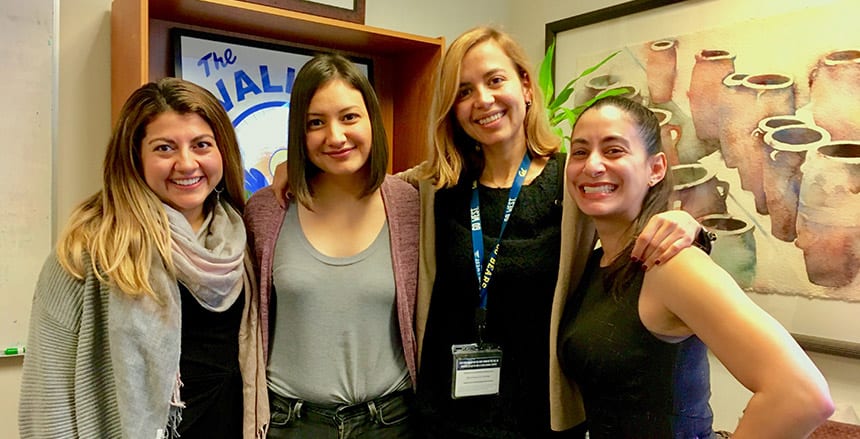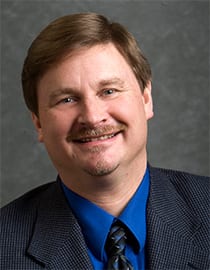
By Andrew Cohen
The daughter of Mexican immigrants who worked as farm workers most of their lives, Veronica Zavala ’18 grew up in the Salinas Valley, a rural, agricultural, predominantly Latino area. Much like the Central Valley, it remains parched for entrepreneurship given the dearth of transactional lawyers and business incubators.
Berkeley Law’s New Business Practicum, the experiential arm of Startup@BerkeleyLaw, has helped Central Valley small businesses since 2011 after a study showed it was one of the nation’s poorest regions with scant legal resources. Thanks to the practicum’s Central Valley Ventures initiative, students are steadily filling that void through workshops, office hours, phone counseling, and online resources.
“We talk a lot about making the law more accessible to low- and modest-means entrepreneurs,” Zavala says. “I understand the challenge, but I think there are ways we can try to minimize this gap.”
One way is to speak their clients’ language. Literally.
Through a new partnership with the Mexican Consulate in Fresno, the practicum now conducts monthly legal workshops and office hours there—in Spanish—after every seat was filled during the first session on March 16.
Students also help lead a monthly training and set of office hours at a business incubator in Merced. This summer, the practicum will deploy additional volunteer attorneys to serve incubators in Modesto and Madera.

“Our focus is on getting legal assistance to new entrepreneurs who need, but can’t afford, an attorney,” says Practicum Director William Kell. “We work to help them survive the difficult legal challenges they must handle within the first couple years of starting a company.”
Legal education on the air
Toward that end, Kell’s office hosted a recent hour-long broadcast on Radio Bilingüe, America’s leading Latino public radio network and content producer. Popular in the Central Valley, Radio Bilingüe is the only U.S. national distributor of Spanish-language programming in public radio.
“I think it was really valuable to communicate to these listeners that they’re not alone in the entrepreneurial journey and that there are free resources available to help them get started,” says Zavala, one of three students involved in the broadcast. “Personally, it was a very rewarding experience.”
Radio Bilingüe Broadcasting Director Maria Eraña approached Deputy Attorney Des Lafleur ’12 after hearing her discuss the practicum’s work at the Central Valley Immigrant Integration Collaborative conference. That led to the Berkeley Law broadcast, where Eraña held a conversation with Lafleur, Zavala, Ana Vinueza ’18, and Silvia Segade Sanz LL.M. ’18.
Providing legal education instead of legal advice, they addressed core issues facing new ventures, misperceptions about the law for undocumented entrepreneurs, and key areas such as forming a legal entity, setting up capital, hiring workers, and protecting intellectual property. They also informed listeners about the practicum’s monthly Spanish-led sessions at the Mexican Consulate in Fresno, its weekly call-in office hours, and its various online services.
“Participating in Radio Bilingüe was an amazing, once-in-a-lifetime experience,” Vineuza says. “Making information accessible and digestible is crucial when trying to empower low-income communities and people of color. As a Latina immigrant, I was more than happy to use my language skills to share the knowledge I’ve acquired through the practicum.”
Debunking myths
Meeting the legal needs of immigrant entrepreneurs, who comprise a large economic sector of California’s Bay Area and Central Valley, involves various challenges. Where most entrepreneurs fortify their businesses by forming legal entities and using written contracts, Lafleur notes that immigrant entrepreneurs often see such formalization as fraught with danger, potentially drawing the attention of immigration authorities.
“In reality, the laws designed to support new businesses and their owners generally protect both citizens and non-citizens,” she explains. “The lack of access to attorneys versed in both business law and immigration law stifles the potential of all California entrepreneurs who were born outside the U.S., whether they’re long-time residents or new visitors chasing the American dream. Consequently, new ventures started by immigrant entrepreneurs are very vulnerable.”
During the Radio Bilingüe broadcast, Sanz discussed these and other common myths. Explaining the requirements to start a new business in the U.S., particularly to low-means entrepreneurs in their own language, “was certainly one of the most gratifying experiences I’ve had during this LL.M. year.”
From Lafleur’s perspective, “hearing four Berkeley Law women with different Spanish accents showing not only willingness, but excitement, to help the community tackle their business law questions should surely show that lawyers can be approachable and that the law can help you rather than hinder entrepreneurial goals.”
Sanz, who has advised large international companies while working for firms in Spain and Belgium, came to Berkeley Law to focus more on the tech industry and connect with smaller businesses. She joined Kell’s New Business Legal Bootcamp after it “was highly recommended by my fellow classmates” who took it first semester.
Zavala envisions her experience serving her well when she begins working this fall at Fenwick & West’s Silicon Valley office, which focuses on startups. “I’ve learned a lot at the Practicum,” she says, “and I would especially recommend it to anyone thinking of doing transactional work.”